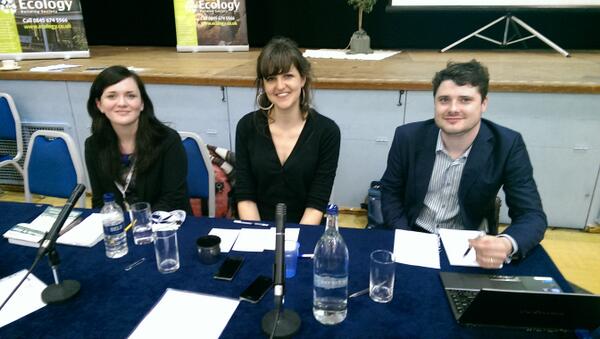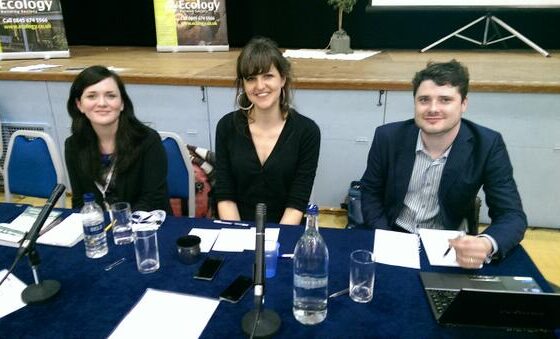

Features
Who has the power to build a sustainable future?
The keynote debate at Ecology Building Society’s annual general meeting (AGM) this year asked an important question: who has the power to build a sustainable future?
Three speakers from different backgrounds took to the floor during the debate to argue the case for financial institutions, politics and communities. This is what they said.
Financial institutions
Beth Stratford, a PhD researcher at Roehampton University, thinks the financial community’s power and influence is crucial in building a sustainable future.
My first slide has inflating houses to illustrate the housing crisis, a flattened planet and a bank about to fall through the ground. These are three crises that are not unconnected and the case I’m going to make is that if we want to solve these crises we are going to need to make some fundamental, big-ticket changes to our financial system.
So let’s start with the housing crisis, as we all know house prices are going completely bonkers – the average house in London is earning more in terms of annual price increases than the average household is earning in wages; that’s how high and how quickly house prices are rising.
So how’s that come about? Well, one of things that drives price inflation is when you have a growing pool of money chasing a limited pool of goods and resources. Houses are a relatively limited pool of goods and the amount of money chasing houses has been growing extraordinarily quickly.
You might wonder how that is possible when our wages have been flatlining for a longer period than has happened since Queen Victoria. Obviously house prices are rising much faster than wages, so where is all this extra money coming from?
The answer is from bank lending. There’s a very common misperception that when banks lend money they take existing money from savings from the system and just transfer it to the borrowers. The truth is that when banks lend money they create brand new money at the stroke of a finger on a keyboard.
This is how 97% of the money in circulation comes into being – through bank lending. In the eight years leading up to the [2008 financial crisis], banks doubled the money supply. That obviously had a huge impact on the health and direction of the economy. In fact, in the four years before the financial crisis, the banks had more spending power than our elected government.
What were they doing with it all? Most of it was going into housing or into the financial sector for speculation; very little of it was actually going to productive business, and you might not be surprised to find out that very little has changed since the financial crisis. Bank lending is still dominated by housing loans and financial speculation. In fact, politicians are doing their best to fuel another debt-based housing boom because they don’t have the imagination or courage to work out how else to get out of the recession.
I don’t know about you, but I think it is kind of weird that we have given a handful of mega shareholder-owned, profit-orientated companies a virtual monopoly over the creation and allocation of the money supply without any real obligation to use that money in the public interest.
I also think it’s kind of weird that we have allowed our banking sector to grow, merge and agglomerate until we have one of the least diverse banking sectors in the whole world. Some countries get why we would want a diverse banking sector, there’s Germany, the US and Japan – each of those gets it.
If you want a banking sector that can properly assess loans for small businesses, for houses, for housing co-ops and actually understand the local context, then you’ve got to have small-scale, regionally-managed banks that really understand the local context.
We simply have lost sight of that. It doesn’t have to be that way; there are things we can do to address that problem.
One thing we could do is to put a size limit on banks, because obviously the too big to fail banks get this enormous subsidy every year because the markets know that the state will come and bail them out of it comes to it.
We could also put hard limits on the amount of money created for speculation. We could have a community reinvestment act. We could, just as a start, set a much better example with the Royal Bank of Scotland (RBS), our own taxpayer-owed bank, which could be broken up into regional banks and have a mandate to lend to the local economy instead of bankrolling the fossil fuel industry.
The World Development Movement estimates RBS’s lending to fossil fuel companies has a carbon footprint of up to 911m tonnes of carbon dioxide – that is around 1.6 times the entire footprint of the UK just from one year of RBS lending.
If you think that’s bad, fossil fuel shares on the London Stock Exchange are valued at about £900 billion. Most of that value comes from estimates of how much oil, gas and coal we are going to be able to get out of the ground. The trouble is that is we get all of that out of the ground and we burn it we will release 470 times more carbon than the UK.
If you have come across the research from the Carbon Tracker Institute [http://blueandgreen.wpengine.com/features/carbon-trackers-latest-analysis-is-a-warning-to-fossil-fuel-investors-everywhere/], you will be well aware that if we want to stay within in a safe carbon budget we can only burn about 20% of proven fossil fuel reserves. We have to leave the other 80% of proven fossil fuel reserves in the ground.
This means, unfortunately, that the quarter owned by public companies, which are largely owned by ordinary people’s pension funds and insurance funds, 80% of that is what is called a stranded asset. Essentially, if we are really serious about tackling climate change then it has no value.
What can we do about this? We have to have much more active shareholders, hassling their pension trustees; we have got to have much more transparency; we have got to have mandatory reporting of the carbon footprint of investments and fiduciary duty, which is unhelpfully interpreted by trustees at the moment as a straightjacket that means they can only work to maximise short-term profit, rather than thinking about the long-term economic and social interests of their beneficiaries.
I think if we clarified all of these things, we would get a long way.
Politics
Alastair Harper, who runs the thinktank Green Alliance’s Political Leadership theme, argues that the political community has the power to create the change needed to build a sustainable future.
I want to start off saying something that I think is pretty controversial: I think politicians have a very difficult job and they actually try quite hard to make progress and make a better world.
Making that better world means making people lose quite a lot. The reason we keep propping up unsustainable housing crises is that no politician can bear to tell someone that their house is worth a tiny bit less. It will always be worth more than when they first brought it but it might be worth a tiny bit less than a year ago, at which point parliament would be burnt down.
It’s a similar thing with stranded assets; it seems perfectly obvious from just an environmental reality that these assets are stranded. You can’t burn them; if you did before you got to the bottom of the pile, we would hope that some legislation would be passed. Even if it didn’t, they wouldn’t get burnt because civilisation wouldn’t really exist anymore. Explaining that to a bunch of traders is quite difficult when they are worried about the next six months.
The problem is that politics isn’t capable of creating the momentum for the problem. What we’ve seen is there are some really obvious problems out there that will be fixed after a political career is over and the full pain will be felt after a political career is over.
There are some examples of things that are becoming clearer. In the short-term, one of the obvious things is the cost of energy bills. The rise of energy and food prices over the last few years has been putting our inflation up by half a per cent each year. Meanwhile, those who earn an average of £6,338 a year spend just under £2,000 of that on their energy bills.
That’s something that gets political notice but some of the wider resource implications doesn’t, so how do we get politics more capable of dealing with this and more capable of acting?
One way is to grow the information. We’ve seen it on decarbonisation; we have a committee on climate change that brings in independent expertise and tells the government what they should be doing about this. Sometimes they even listen.
We can do the same with resources and create an institute for resources that advises on the budget and points out if [the government] is doing something incredibly stupid for the medium and long-term in the interest of the next six months of the economy – something that requires departments to reply to it.
But I would argue still that that is something quite abstract, something quite elite and technocratic and takes away from the public, which is the problem that we face when we are trying to make the right decisions.
Most of this country quietly loves wind farms but a very few loudly hate them and that has caused a political reaction, certainly in the media a narrative reaction. Part of the thing we need to start seeing is the growth of public engagement in what they love, something that Ecology Building Society is the perfect example of, but we need to role out the model and make more environmental winners in this country, rather than just framing the narrative as a problem we are trying to avoid.
One example of that is the Green Investment Bank. At the moment, it uses public money to invest in environmentally good infrastructure. Why don’t we let the public benefit from that by getting the public to invest in bonds that are backed by the offshore wind projects or the energy efficiency projects that we know will get a return?
In doing that, we create policy certainty in the same way that there is policy certainty to create a housing bubble. If we had 20,000 members of the public investing in government-backed offshore wind, it would be a heck of a lot harder for the chancellor to scrap those projects at the next budget.
In the same way, we can involve the public in the deployment of local infrastructure a lot more than we do now. At the moment we tend to use central government agencies to take the money to do flood defences or we give economic backing to large businesses to invest in big infrastructure.
If instead we could let local communities to bid into plans for central government funding for things like local flood defences, city energy or food management, we would start to get people active and wanting to defend environmental policies in this country.
It’s about opening up the whole country to the opportunities of a growing green economy. If we do that, it gets a heck of a lot easier for politicians to act.
People
Anna Dart, a Balcombe resident during the recent anti-fracking protests against Cuadrilla last year, says people – and activists – are the most important levers.
My experience has been quite depressing in one sense and quite encouraging in another. Finance comes from people, politics comes from people – so it all starts at the beginning with us at the grassroots level and I think what we are seeing now is a failed economic system, a failed political system and we therefore need to start in our communities rebuilding politics and finance.
A recent YouGov poll showed that people supported wind farms in contrast to fracking by three to one, but the government is still pressing ahead with fracking in this country and making it more difficult to build wind farms.
Opposition in the UK has grown tremendously against fracking since 2013, with the protest in Balcombe we have seen growing public awareness about this issue, but the government still wants to press ahead.
The government now wants to get rid of the law on trespass, which will mean effectively that fracking companies can frack underneath your own private property without you being able to do anything about it and this should enrage us all and make us want to take action in our local communities.
There was a poll conducted in Balcombe, which showed that 82% of residents opposed fracking and yet despite all of this, a West Sussex county council planning officer recommended that Cuadrilla be given approval to frack in Balcombe, in spite of some 900 letters of objections. This really is quite depressing and it means we really need to take action on the ground because local democracy has completely failed.
So where do we go from here? It starts with you and me. I’m not an expert in fracking I’m just an ordinary citizen who has seen my community torn apart by companies like Cuadrilla seeking to frack. If you want to know about the affects of fracking I recommend that you watch the Josh Fox film Gasland 2 about the effects of fracking in America. America is often held up as a success story in terms of fracking but the [documentary] really shows the damage that is does in terms of water contamination, air quality, birth defects and increased cancer rates.
In Balcombe, a new social enterprise was started last year called RePower Balcombe and it aims to eventually create the equivalent of 100% of Balcombe’s energy through renewable resources.
It’s quite strange this disconnect. People at the grassroots level are taking these kinds of initiatives and yet at the same time Cuadrilla is being given approval to frack and the government is pushing ahead with this through its support for the fracking community.
So what can we do? I think we need to go back to our communities – vast swathes of the UK have been identified as areas that could be fracked in the future, so therefore no place is safe in the UK.
We need to go back to our communities if we are against fracking. We need to create small groups that oppose fracking companies if they come on our doorstep, but also need to come up with alternatives and create new initiatives that support renewable energy.
Photo: Ecology Building Society
Further reading:
Ecology Building Society AGM: sustainable finance makes ground
What’s gone wrong with finance?
IPCC findings demand investment in a sustainable future, say investors
Investing for the past or investing for the future?
A sustainable investment revolution must emerge from the IPCC’s stark warning
































